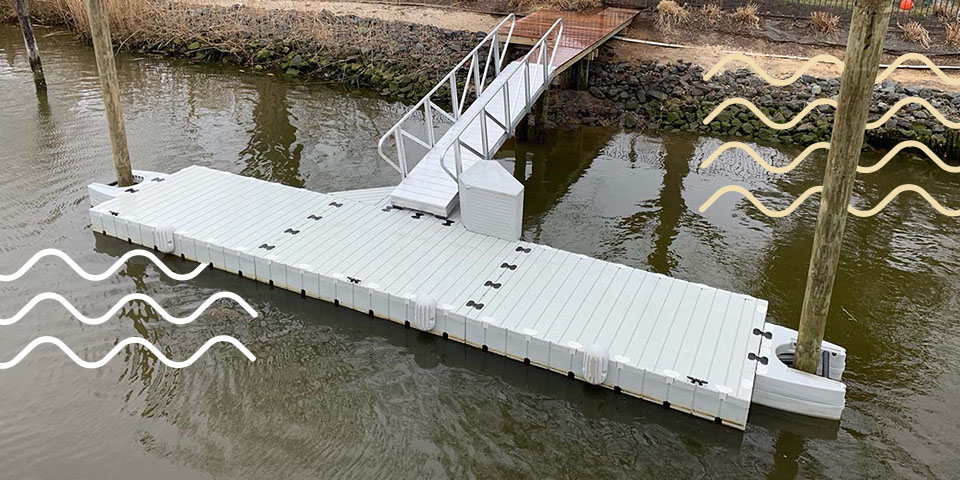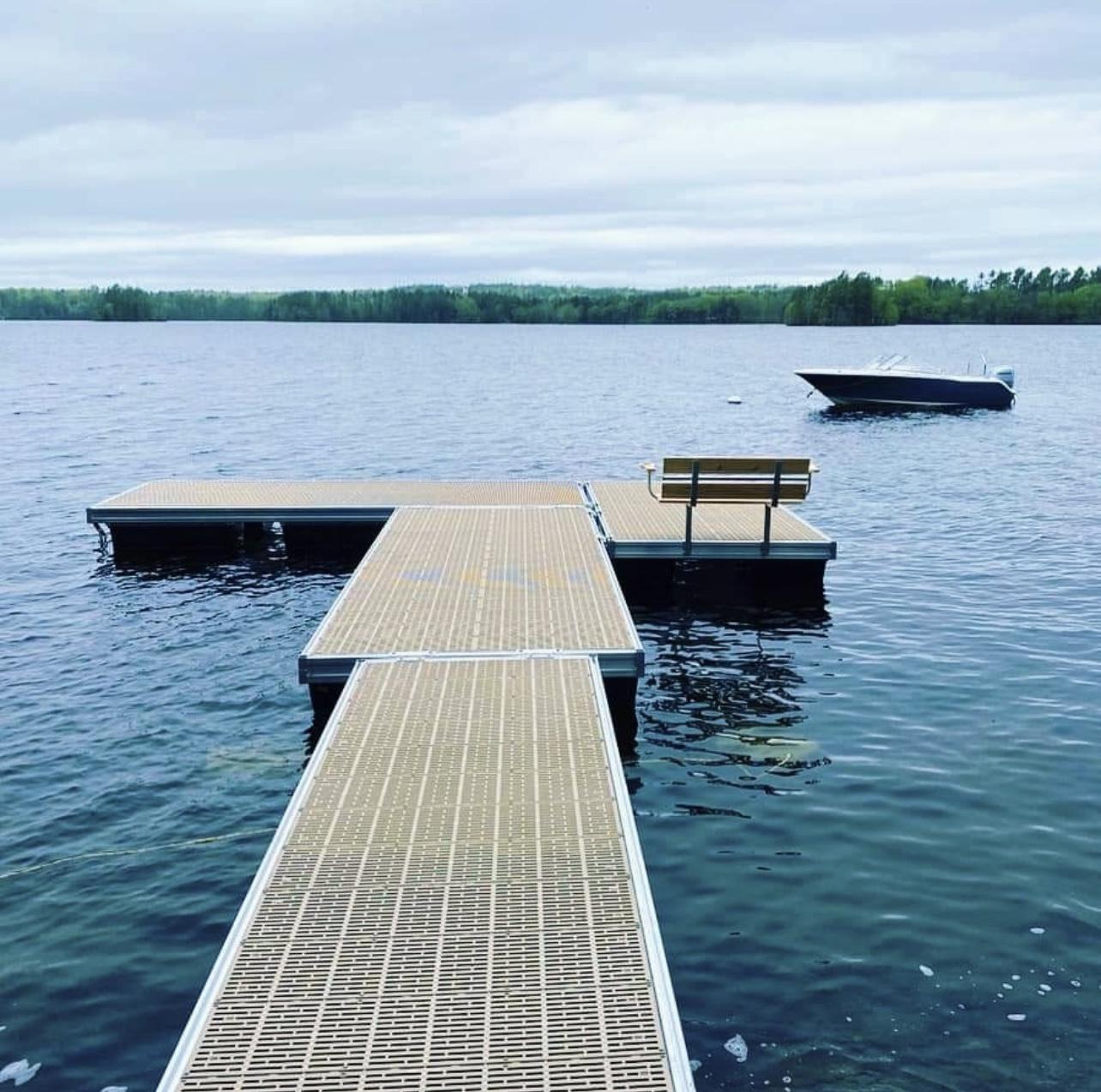Your Overview to Finding the Best Dock Company for High Quality and Dependability
Your Overview to Finding the Best Dock Company for High Quality and Dependability
Blog Article
Floating Docks: The Suitable Selection for Versatile Water Access
Floating docks existing an engaging solution for a variety of water access requires, using convenience that goes beyond conventional mooring options. The modular nature of floating docks assists in personalization, catering to details needs.
Benefits of Floating Docks
Floating docks offer countless advantages that enhance water gain access to for numerous applications. Their ability to fall and climb with altering water levels makes them especially useful in atmospheres with changing tides or seasonal variations. This versatility guarantees that vessels can easily moor without problem for the water's deepness, supplying a trustworthy platform for entertainment, industrial, and commercial uses.
Additionally, floating docks are typically constructed from sturdy materials that withstand deterioration, making them suitable for long-lasting usage in marine atmospheres. Their installment is generally much less intrusive than traditional fixed docks, minimizing the ecological impact and helping with quicker implementation (floating docks). This versatility enables simpler moving or reconfiguration according to customer demands or environmental changes
Safety is an additional vital advantage; floating docks can supply secure accessibility for people getting off or boarding from watercrafts and minimize the threat of crashes connected with unsteady surface areas. Moreover, they can be created to fit a selection of devices, such as fenders and cleats, improving functionality. Generally, floating docks represent an effective solution for boosting water accessibility across diverse industries while promoting safety and security and ecological sustainability.

Kinds Of Floating Docks
Various sorts of floating docks satisfy different needs and atmospheres, each designed with certain features to maximize capability. The most typical kinds include modular docks, which are composed of interlocking sections that permit for easy modification and expansion. These docks are excellent for recreational use, as they can be tailored to fit numerous boat dimensions and water problems.
One more popular alternative is the stationary floating dock, which continues to be secured in position yet drifts with changing water levels. floating docks. This type is specifically suited for areas with minimal tidal variations, offering stable access for fishing or swimming. Additionally, there are drive-on docks, which include a sloped design that permits watercrafts to quickly drive on and off, making them appropriate for individual watercraft and smaller sized vessels
For commercial applications, sturdy floating docks are offered, created from enhanced products to withstand substantial loads and harsh aquatic settings. Eco-friendly floating docks make use of sustainable products and designs to reduce ecological impact, usually including attributes like plants to sustain neighborhood wildlife. Understanding the numerous sorts of floating docks ensures that customers can choose one of the most proper solution for their particular demands.
Setup Refine Summary
An effective installation of floating docks needs mindful planning and interest to detail to guarantee optimal performance and safety. The first step entails evaluating the website problems, including water depth, present, and prospective barriers. This evaluation educates the option of the ideal dock materials and design customized to the particular setting.
Following, getting essential permits is critical, as numerous territories have guidelines concerning building on water bodies. The installation can proceed once authorizations are safeguarded. Begin by preparing the foundation, which might entail anchoring systems or pilings customized to the dock type and regional conditions.
Following the structure setup, put together the dock sections according to supplier specifications. Guarantee that all components are safely fastened and lined up to hold up against ecological stress and anxieties. Setting the dock in the designated area, guaranteeing it is degree and secure.

Maintenance Tips and Ideal Practices
After the installation process is total, continuous upkeep plays a vital duty in ensuring the long life and capability of floating docks. Regular examinations need to be conducted to determine any kind of indicators of deterioration, damage, or wear - dock company. Look for any kind of loosened fittings, fractures, or splitting up in the dock areas, as these can compromise architectural honesty
Cleaning click the dock is necessary to eliminate particles, algae, and other build-up that can influence its appearance and safety and security. Make use of a gentle pressure laundry occasionally to maintain sanitation without causing damage to the surface. In addition, applying a safety sealant every couple of years can assist boost longevity and stand up to environmental wear.
Pay interest to the mooring lines and anchors, ensuring they are free and safe from rust. Change any abject components immediately to stay clear of dangers. Seasonal adjustments may also be essential; throughout extreme climate conditions, reinforcing the dock or repositioning can avoid damage.
Applications for Floating Docks
Floating docks offer a wide variety of applications, catering to both commercial and leisure demands. In entertainment settings, they offer seamless access to rivers for activities such as boating, angling, and swimming. Their flexible nature permits installation in differing water levels, making sure secure and steady gain access to despite tidal fluctuations.
Readily, floating docks are essential for marinas and waterside businesses. They assist in the docking of vessels, enabling reliable dumping and filling of goods. Their modular style enables very easy development or reconfiguration to fit altering company needs, making them optimal for watercraft rentals, tour operations, or fishing charters.
In addition, floating docks are made use of in environmental applications such as marine study and environment remediation. They can work as platforms for clinical researches, keeping an eye on water high quality, or carrying out wildlife studies without disturbing sensitive ecological communities.
In industrial contexts, floating docks are used in building projects, offering access to hard-to-reach areas for tools and employees. Their adaptability, toughness, and very little influence on the environment make them an optimum selection for a variety of applications, boosting both functionality and access in different water-based atmospheres.
Conclusion
In final thought, floating docks represent an optimal solution for varied water gain access to requires, owing to their flexibility, resilience, and modular style. These frameworks facilitate secure mooring for numerous applications while lessening ecological impact throughout installation. The reduced maintenance needs better boost their practicality. Thus, floating docks offer as an important property for leisure, commercial, and ecological tasks, making sure reliable accessibility to rivers and promoting lasting methods continue reading this in water environments.
Floating docks present a compelling solution for a range of water gain access to needs, supplying versatility that transcends conventional mooring options.Floating docks offer many benefits that improve water accessibility for numerous applications. On the whole, floating docks stand for look at this site an efficient option for enhancing water gain access to across diverse industries while promoting safety and environmental sustainability.
An additional preferred alternative is the fixed floating dock, which remains anchored in area yet drifts with altering water degrees.In final thought, floating docks stand for an ideal service for diverse water access requires, owing to their adaptability, durability, and modular layout.
Report this page